Wang Haoze: 'I Am Fortunate to Be an Astronaut'
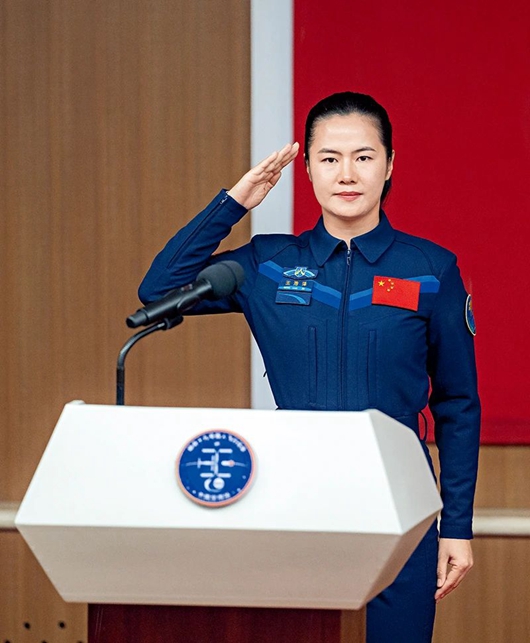
At 4:27 a.m. on October 30, 2024, the Shenzhou-19 spaceship, atop a Long March-2F carrier rocket, soared into space from the Jiuquan Satellite Launch Center, in northwest China's Gansu Province. The Shenzhou-19 crew left Earth to fulfill their dream of space exploration. The mission marked the first time China sent two astronauts, born during the 1990s, into the vast cosmos. Among the crew was Wang Haoze, a young woman astronaut, who became China's first woman space engineer and the third Chinese woman to participate in a manned spaceflight. The crew remained in China's space station for 183 days, where they conducted scientific experiments and tests. The return capsule of the Shenzhou-19 crewed spaceship touched down at the Dongfeng landing site in north China's Inner Mongolia Autonomous Region on April 30, 2025, and the China Manned Space Agency declared the mission a success.
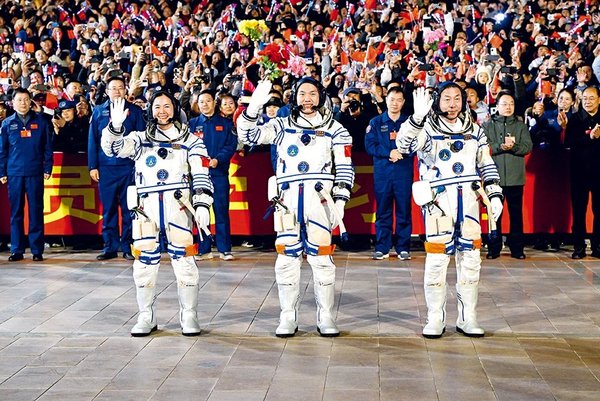 |
| Send-off ceremony for three Chinese astronauts of the Shenzhou-19 crewed space mission was held at Jiuquan Satellite Launch Center. |
Taking Tasks Seriously
Born in March 1990 in Luanping, a county in north China's Hebei Province, Wang grew up in a loving family. Her father, a traffic police officer, instilled in her a strong sense of discipline and efficiency. Her mother, a middle school teacher, taught her "there is nothing a girl cannot do," and that fostered in Wang confidence and resilience.
In 2005, Wang was admitted to Tangshan No. 1 High School, in Hebei. She stood out as a diligent, proactive and self-disciplined student. She excelled academically and physically.
Three years later, Wang enrolled in the School of Energy and Environment, Southeast University, in east China's Jiangsu Province. She earned a bachelor's degree, in energy and power engineering, and later a master's degree, in thermal energy and power engineering, both from the university. During her graduate studies, she delved into the challenging field of plasma detonation. Initially overwhelmed, she asked, "Why should I tackle such a difficult project if I might not pursue research long term?" Her advisor's response had a lasting impact. "I don't expect you to dedicate your life to research, but whatever you do, do it seriously. Cultivate this habit now, or you'll struggle even with things you love later."
Under her advisor's guidance, Wang mastered the principles and methodologies of plasma detonation, as she transitioned from passive learning to active exploration. This experience ignited her passion for scientific research, and it laid the foundation for her future aerospace career.
Changing Roles, Same Mission
In 2015, Wang joined the Beijing Aerospace Propulsion Institute, under the China Aerospace Science and Technology Corporation, where she has since specialized in pre-research of rocket engines.
Colleagues have consistently described her as articulate, insightful and tenacious — a "little cheetah" brimming with energy. Within a year, Wang had tackled the design of a microchannel heat exchanger, which accelerated development of the unit. Her academic contributions, including nearly 10 patents and published papers (combined), earned her an early promotion to senior engineer, surpassing all of her peers.
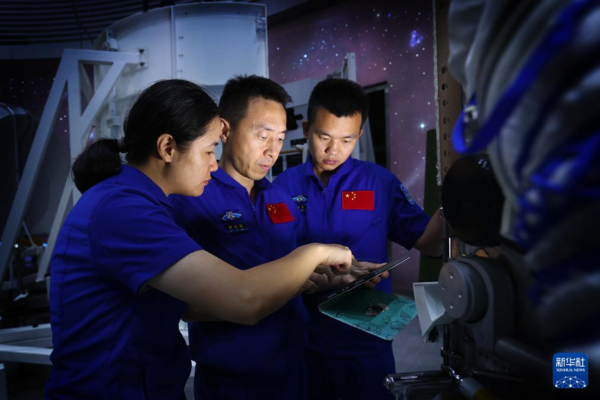 |
| Wang Haoze, Cai Xuzhe (middle) and Song Lingdong (right) during training |
In 2018, China began the process to select its third group of astronauts. Seizing the opportunity, Wang applied. Transitioning from an engineer to an astronaut required not only technical expertise, but also exceptional adaptability, physical fitness and mental resilience. Unlike her teammates, who had flight experience, Wang had to start from scratch. "Every day brought new challenges," she recalls.
Training included grueling physical conditioning, psychological drills and space environment simulations. During centrifuge tests, Wang endured force six times her body weight. Not once did she press the emergency button. "I am the only woman among the country's third group of astronauts, and I don't think I should receive special treatment ... I had the competence and confidence to compete with my other 17 teammates," Wang says.
After years of rigorous training, Wang was selected for the Shenzhou-19 crew, alongside the commander, Cai Xuzhe, and Song Lingdong, the other astronaut born during the 1990s. On October 29, 2024, the crew was introduced to the public during a news conference at Jiuquan Satellite Launch Center. "From being a rocket-engine designer to a space engineer, my role has evolved, yet my unwavering commitment to serving my country through space exploration remains the same. From building rockets to riding them, from propelling others into space to venturing there myself, I want to extend my deepest gratitude to all aerospace science and technology workers," Wang said during the news conference.
Wang, however, was not speaking only for herself, but on behalf of the countless individuals who dedicated themselves to China's aerospace cause. After all, astronauts carry not only personal dreams of space exploration, but also the hopes of the nation and its people.
Endless Exploration
On October 30, 2024, the Shenzhou-19 spaceship docked with China's space station. As part of her mission, Wang focused on 86 space experiments and technical tasks. Her theoretical expertise, and her familiarity with manuals, impressed her teammates.
During a video conversation with Bulgarian students, on November 30, Wang vividly described the weightlessness. "Seconds before entering orbit, we felt crushed into our seats; and then suddenly, we floated. It was magical!" she explained.
On New Year's Day 2025, the crew sent New Year's greetings from space, and Wang introduced Xiao Hang, an AI (artificial intelligence) assistant capable of cabin inspections, inventory management and problem solving. "Xiao Hang, rise a bit. Xiao Hang, take a photo," Wang commanded, to highlight the advancements in smart space technology.
To mark International Women's Day, on March 8, 2025, Wang sent greetings to women and girls. "I hope you can become the bright moon, as well as the twinkling stars. Become your own little sunshine, and grow up in the radiant and enchanting spring," Wang said, in a video recorded aboard the orbiting Tiangong space station.
"I am fortunate to be an astronaut," Wang says. Behind her "fortune" lie years of relentless efforts and a solid scientific foundation. In her master's thesis acknowledgments, she wrote: "On life's grand stage, I vow to strive without retreat." Today, shining in the boundless cosmos, Wang has fulfilled her promise.
"Ours is a road less traveled," Wang reflects. "If it's thorny, we'll cut through. If desolate, we'll walk together. If dark, we'll light it with our lives."
From Liu Yang (China's first woman astronaut) and Wang Yaping (the first Chinese woman to perform a spacewalk) to Wang Haoze, women continue to write new scripts in China's space odyssey. As lunar exploration and space-station projects advance, China's space endeavors, driven by generations of young talent, will illuminate humanity's quest to unravel the universe's mysteries.
Photos from VCG and Xinhua
(Women of China English Monthly May 2025)
Editor: Wang Shasha
Please understand that womenofchina.cn,a non-profit, information-communication website, cannot reach every writer before using articles and images. For copyright issues, please contact us by emailing: website@womenofchina.cn. The articles published and opinions expressed on this website represent the opinions of writers and are not necessarily shared by womenofchina.cn.



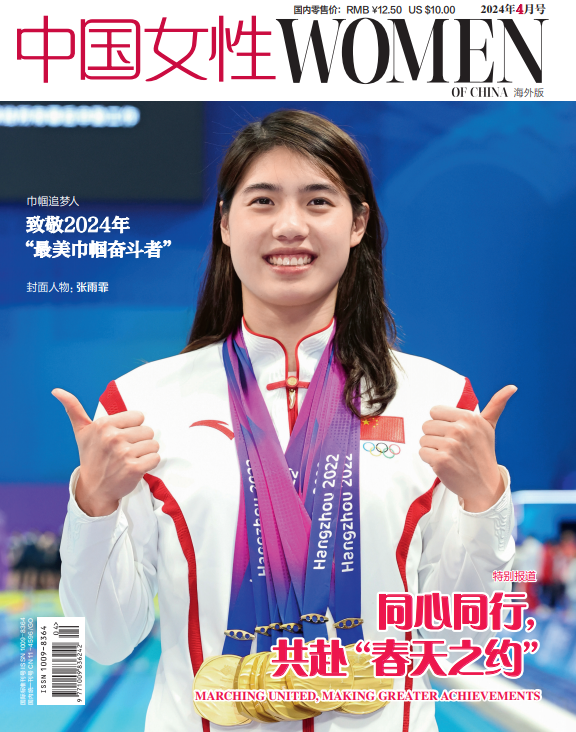



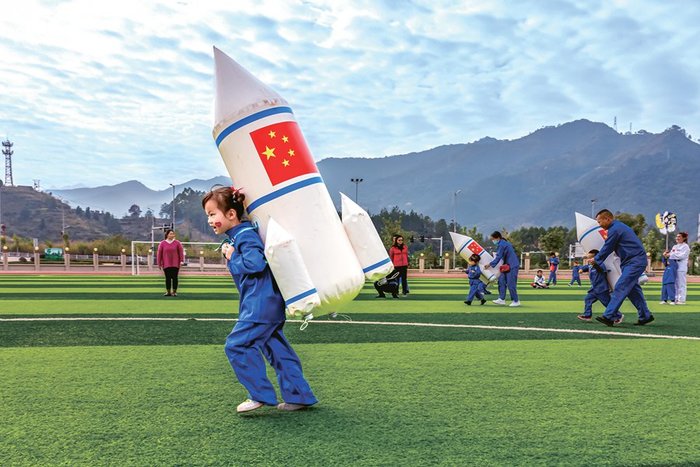
.jpg)

 WeChat
WeChat Weibo
Weibo 京公网安备 11010102004314号
京公网安备 11010102004314号